Things You'll Need
Bucket
Newspaper
Sealable plastic bags
Perlite or sphagnum moss
2-gallon nursery pots
Potting soil
Milled peat
Coarse sand or perlite
Mulch
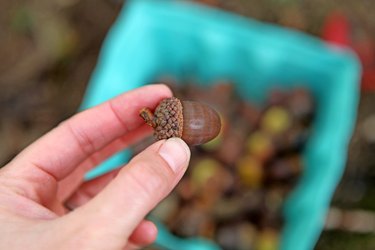
All species of oak (Quercus spp.) grow from acorns, although their specific germination requirements vary according to their type. Most cultivated oak species fall into one of two categories: the red or black oak category or the white oak category. Acorns of the former type mature slowly and require chilling, while the latter germinate readily without pretreatment. No matter which type of acorn, they perform best if started in pots to keep them safe from foraging animals. However, the pots must be deep enough to accommodate their long taproots with adequate drainage.
Step 1
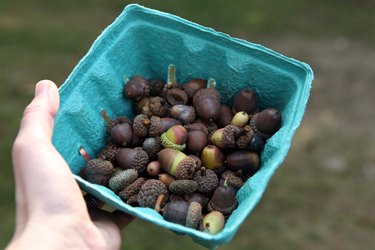
Gather acorns in autumn immediately after they drop to the ground. Choose acorns with a dried cap and a glossy brown casing with no hint of green. Avoid acorns with obvious defects or damage, such as insect holes, cracks, shriveled spots or discolorations.
Video of the Day
Step 2
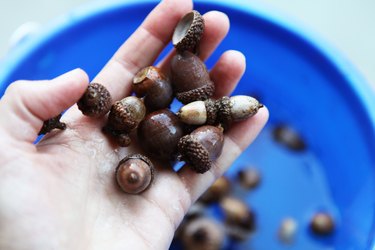
Collect the acorns in a bucket. Fill the bucket with cool, clean water and set it in a sheltered location. Soak the acorns overnight to determine which are viable. Scoop out and discard any acorns that are floating on the surface the following morning; they are likely inviable.
Step 3
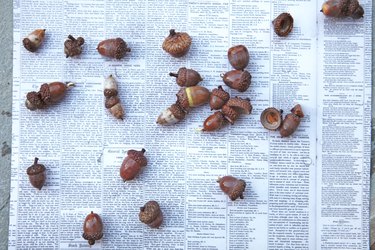
Remove the acorns that sank to the bottom of the bucket. Spread them out on a sheet of newspaper for roughly 20 minutes to let any excess moisture evaporate. Turn them occasionally so all sides can dry.
Step 4
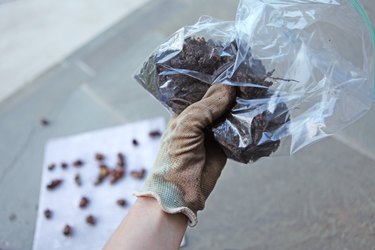
Cold stratify red oak-type acorns for at least 30 days to break their dormancy before sowing. Place them inside a sealable plastic bag filled with moistened perlite or sphagnum moss and place the bag inside the refrigerator. Remoisten the perlite whenever it feels nearly dry.
Step 5
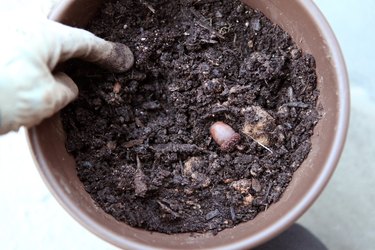
Fill 2-gallon nursery pots with a fast-draining growing medium such as a mix of equal parts potting soil, milled peat and coarse sand or perlite. Sow two acorns in each pot at a depth equal to their diameter; for instance, a 1/2-inch-wide acorn should be sown at a depth of 1/2 inch. Lay the acorn on its side in the hole and then completely cover it with medium.
Step 6
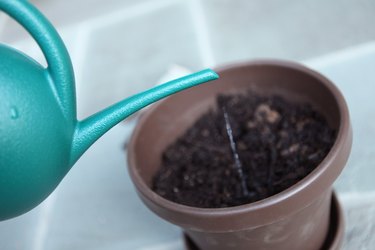
Place the pot outdoors in a sheltered, lightly shaded location. Water to a 3-inch depth during the autumn and winter months if no rain falls for longer than one week. Let the medium dry out completely in the top 1 inch before watering again to prevent excess moisture from building up around the acorns.
Step 7

Move the nursery pots into full sun in spring after the last frost. Continue to water the acorns whenever the soil dries out in the top inch. Watch for germination in one to three months after daytime temperatures stay reliably above 75 degrees Fahrenheit. Remove the smaller of the two oak seedlings from each pot, if both acorns successfully sprout.
Step 8
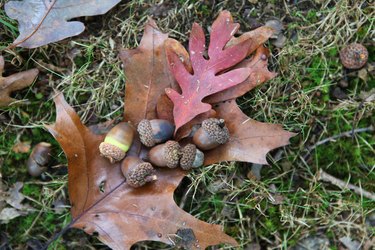
Grow the oak seedlings under sheltered nursery conditions for one to two months or until they produce several sets of mature foliage. Transplant them into a planting site with growing conditions suited to their species. Provide weekly irrigation during their first summer in the ground, as well as a 2-inch-thick mulch layer to conserve water and protect their roots.
Tip
The white oak type includes species such as the valley oak (Quercus lobata) and Southern live oak (Quercus virginiana); the former grows within U.S. Department of Agriculture plant hardiness zones 7 through 9 while the latter grows in zones 7 through 10.
The red oak type includes the red oak (Quercus rubra), which grows in zones 5 through 8, and the burr oak (Quercus macrocarpa), which grows in zones 3 through 9.
Cover the pots with wire mesh if foraging critters interfere with the acorns.
Use pots with multiple drainage holes at the base.
Video of the Day
- The Ohio State University Extension: How Mighty Is the Oak: Oaks for the Midwest Landscape
- Texas A&M University Department of Horticulture: Propagation of Ornamental Trees, Shrubs and Woody Vines
- Iowa State University Extension and Outreach: Germination of Tree Seed
- Cal Poly Urban Forest Ecosystems Institute: Valley Oak
- Cal Poly Urban Forest Ecosystems Institute: Southern Live Oak
- Cal Poly Urban Forest Ecosystems Institute: Red Oak
- Cal Poly Urban Forest Ecosystems Institute: Burr Oak
- USDA Forest Service: Woody Plant Seed Manual
- Kootenay Local Agricultural Society: Tree and Shrub Seed Germination Information